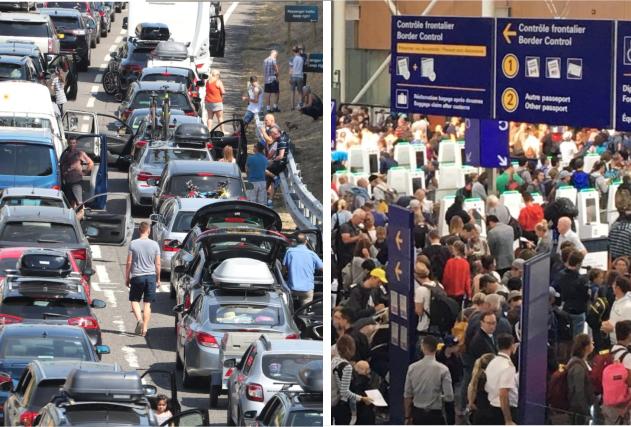The travel warning of huge queues for British holidaymakers as major change to European travel comes next summer.
The Brits have been warned to expect huge delays when heading to Europe next year due to new European Union rules at the border.
The EU is rolling out their new Entry/Exit System (ESS) which will require additional documents and checks for all non-EU travellers.
With the United Kingdom having left the EU due to Brexit, this means Brits can expect longer waiting times when using the ferry ports and Channel Tunnel.
It is expected to be in place from May, with non-EU arrivals needing to have a photograph taken, as well as four fingerprints scanned.
However, due to families often driving as a group via car, experts have warned this is likely to result in long queues, as it will be unlike the faster system of e-gates at UK airports.
Tim Reardon, head of EU exit for the Dover Harbour Board, said that there is no way of doing a biometric control without getting everyone out of the vehicle. That’s the one thing on our site which cannot happen because they are in the middle of live traffic.
This would be equivalent to asking people to get out of their car at a motorway toll booth. It’s fundamentally unsafe and it can’t happen.
Others have warned that it means thousands of non-EU travellers would have to be processed an hour, which is “impossible”.
John Keefe, director of public affairs for Getlink, explained that the Eurotunnel can carry as many as 2,500 passengers an hour.
He warned that they would be looking at 1,600 to 1,700 passengers per hour to be processed for the first time. That’s an impossible task in the space that we have available.
Similar problems are also expected to affect Eurostar, with the train’s strategy director adding: “We don’t currently see a practical solution.
In a peak hour in August they have 1,800 passengers. About 1,500 of those would be required to go through the EES, of whom 830 would be first-time travellers.
Next year will also see the introduction of the European Travel Information and Authorisation System (ETIS) which will cost Brits an extra €7.
Under the scheme Brits will have to apply for a travel pass online before boarding the plane to the continent. The visitors will be asked for information about their identity, passport, education, job, recent travel, and criminal convictions.
Under-18s will be exempt, and the passes will be valid for three years and can be used for multiple trips.
The Brits will also need extra time on their passport to go on holiday to the EU.
New rules mean passports must have at least three months on them to travel to destinations such as France and Spain, and must not be more than 10 years old












